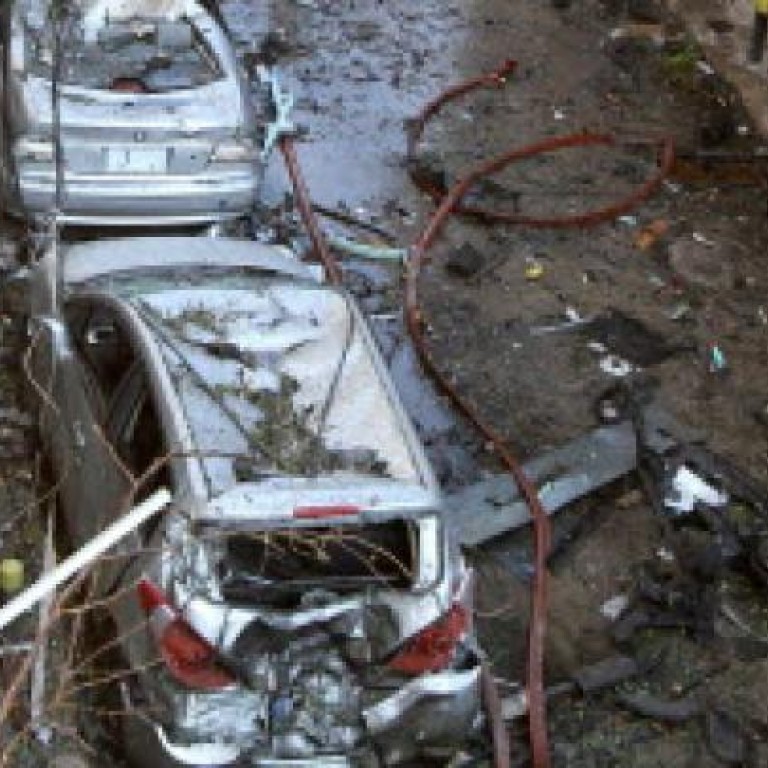
Assad accused after Beirut bomb kills security official
A car bomb blast in Beirut on Friday killed eight people including a top security official linked to the anti-Damascus camp in Lebanon, prompting opposition calls for the government to resign.
The rush-hour bombing in the predominantly Christian district of Ashrafieh also left 86 people wounded, Information Minister Walid Daouk said.
Two Lebanese political leaders have already blamed Syrian President Bashar al-Assad for the attack, which has drawn international condemnation.
And the country’s key opposition groups, after an emergency meeting on Friday, called on the government to step down.
Among those killed was the intelligence chief of Lebanon’s Internal Security Forces, General Wissam al-Hassan, an official said, in one of the most high-profile assassinations since the 2005 murder of ex-premier Rafiq Hariri.
“The government must leave and we call on Prime Minister Najib Mikati to resign immediately,” said Ahmad Hariri, secretary-general of the Future movement, reading from a statement.
“Prime Minister Najib Mikati is personally responsible for the blood of General Wissam al-Hassan and the innocent” victims of the attack, he added.
Hassan was close to Hariri’s son, Saad, who is leader of the opposition and hostile to Assad’s regime. He had been tipped to take over as ISF head at the end of this year.
Both Saad Hariri and Walid Jumblatt, Lebanon’s Druze leader, accused the Syrian president of being behind the attack.
“We accuse Bashar al-Assad of the assassination of Wissam al-Hassam, the guarantor of the security of the Lebanese,” Hariri, who is also a former premier, told a Lebanese TV station.
Jumblatt, a longtime critic of Damascus, said: “I openly accuse Bashar al-Assad and his regime of killing Wissam al-Hassan.”
“The Syrian regime is expert in political assassinations,” Jumblatt said. “Our response needs to be political. A president who burns Syria and is the executioner of Damascus does not care if Lebanon burns.”
The explosion occurred only 200 metres from the headquarters of the Christian party, the Phalange, which is also anti-Damascus.
No one claimed responsibility for the bombing, but Phalange MP Nadim Gemayel quickly accused Syria, the former power brokers in Lebanon, of orchestrating it.
“This regime, which is crumbling, is trying to export its conflict to Lebanon,” he said of the Damascus government.
Syrian Information Minister Omran al-Zohbi condemned what he called a “terrorist, cowardly” attack. Such incidents were “unjustifiable wherever they occur,” he said.
Lebanese opposition politician Samir Geagea said Hassan “moved around with exceptional security measures” and had sent his wife and children to Paris because he “knew he was a target.”
The ISF played a central role in the arrest in August of Lebanon’s former information minister Michel Samaha, who has close links to Damascus. He was charged with planning attacks in Lebanon and transporting explosives.
The agency was also deeply involved in seeking the arrest of those responsible for a host of attacks and assassinations between 2005 and 2008, starting with the Hariri assassination.
Following the news that Hassan, a Sunni Muslim, had been killed, angry Sunnis set fire to tyres and blocked the road from the northern city of Tripoli to the Syrian border, a journalist witnessed.
The United Nations, France and the United States condemned the attack.
UN Secretary General Ban Ki-moon urged “all Lebanese parties not to be provoked by this heinous terrorist act,” in a statement released by his spokesman.
The blast ripped through a busy square as pupils were leaving schools and bank employees headed home.
The force of the blast gutted two apartment blocs, tearing off balconies and shattering windows. Falling masonry crushed cars parked below.
Nancy, aged 45, was in tears as she explained how she had narrowly escaped death. “Had we not been out of the house buying medicines, we would have died,” she said. “Our house was burned. Thank God we’re alive.”
The last car bombing in Beirut was on January 25, 2008, when Lebanon’s top anti-terrorism investigator and three other people were slain.
The attack has touched off painful memories of Lebanon’s 1975-1990 civil war and the political unrest that has troubled the post-war years, much of it linked to Syrian influence in the country.
Rafiq Hariri’s murder on February 14, 2005 was the most high-profile killing since the civil war. The former premier and 22 other people were killed as his motorcade drove along the waterfront.
At the time, Lebanon was occupied by Syrian troops, who had entered the country during the civil war under an Arab League mandate. The country’s politics were dominated by Damascus.
The international outcry that followed the Hariri assassination prompted Damascus to withdraw its troops from Lebanon, but Syria still exerts a strong influence.
No one has ever been tried for Hariri’s murder, but a UN-backed tribunal has indicted four members of the Shiite Muslim group Hezbollah, which now dominates the Lebanese government and is allied to Damascus.
In its reaction to Friday’s attack, Hezbollah said it was “an attempt to destabilise Lebanon and national unity.”
